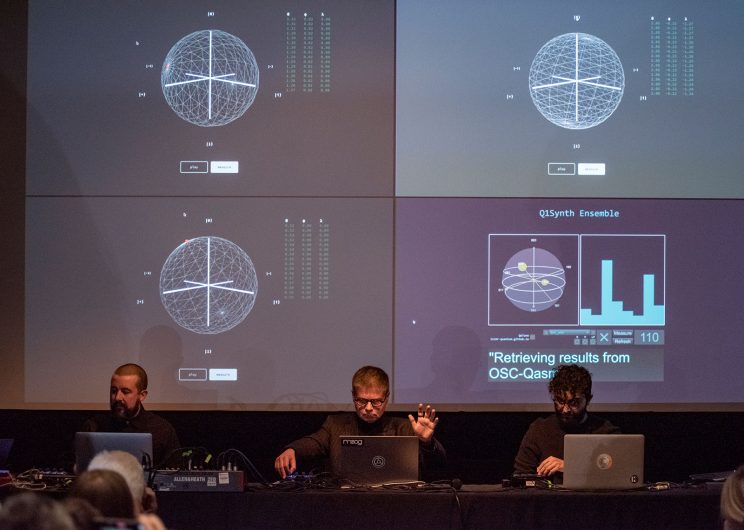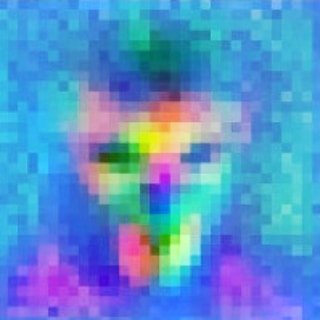
IKLECTIK presents,
Many Musics, Quantum Worlds
Monday 24 April 2023 | Doors: 7:30pm | Start: 8pm
Our Kiosk opens 1 hour before doors.
Tickets: £8 General Admission https://link.dice.fm/l693a1fcdc20
Aleatoric or deterministic, mystical or logical, are familiar adjectives in experimental music since the 1950s. For instance, in 1951 John Cage used an Oriental fortune teller system to create Music of Changes for piano: he consulted the I Ching to make compositional decisions. Around the same time, Pierre Boulez composed Structures for two pianos. Every aspect of Structures was decided by rules. Boulez determined the rules beforehand and followed them strictly to assemble the piece.
With the advent of digital computers, composing like Cage or Boulez became commonplace. Today, musicians are versed in programming computers to simulate randomness and or follow rules. Computers have become important musical instruments.
Computing technologies, however, are ever-evolving. And so is music.
Quantum computing is a nascent field of technology. With rapid advancements in recent years, there is every reason to believe that quantum computers will soon have an impact across industries. But how might quantum computing be used creatively by musicians and artists?
A quantum computer deals with information in terms of quantum bits – or qubits. The qubit is to a quantum computer what a bit is to a digital one: it is a basic unit of information. In hardware, qubits live in the subatomic world. Programming a quantum computer involves leveraging quantum mechanical phenomena, such as superposition, entanglement and interference, to process information.
As quantum computers loom on the horizon, musicians are beginning to experiment with them in creative ways. For Many Musics, Quantum Worlds, IKLECTIK teamed with the University of Plymouth and Moth — a quantum technology and arts company — to stage four examples of this.
Performers:
Cephas Teom
ecolagbohrsac2021
Paulo Itaborai
Eduardo Reck Miranda, Cephas Teom and Paulo Itaborai
Warning: Some performances might use strobes and/or flashing lights.
Cephas Teom
Dependent Origination, by Cephas Teom, is inspired by the Buddhist saying that no beings or phenomena exist independently of other beings and phenomena. Quantum mechanics revisits this tenet with the notion of quantum entanglement, which Albert Einstein referred to as ‘spooky action at a distance’. Action at a distance occurs when two entangled objects affect each other even if they are separated at long distances, without mechanical contact. Entanglement is at the heart of quantum computers. Entangled qubits enable quantum computers to make calculations in radically different ways. Cephas programmed entangled qubits to generate streams of data. These data subsequently are rendered into sounds during the performance using Zen, a live coding environment of his own design.
https://cephasteom.co.uk/
ENGLAND’S COUNCIL OF LEGISLATION AND GOVERNING BODY OF HYPER REAL SIMULATIONS AND CONSTRUCTS [a.k.a ecolagbohrsac2021]

Having engaged with the concept/practice through the Beyond Quantum Music festival, ENGLAND’S COUNCIL OF LEGISLATION AND GOVERNING BODY OF HYPER REAL SIMULATIONS AND CONSTRUCTS [aka ecolagbohrsac202]’s approach sits on the fence, whereas one syde is the direct utilisation of quantum computing/tools for composing music using quantum states for personal study on randomness, sense of reality and nature of creativity/oneself, while the other syde is a conceptual study, a legion of defence against various speculative cynteries and mythic themes that populate the archetypal strata of the modern technological psyche.
https://ecolagbohrsac2021.co.uk/
Paulo Itaborai
Rasgar, Saber is played through eight speakers arranged as two quadriphonic systems. One of them is composed of four purpose-built speakers coupled with origami-like figures to interfere with the sounds. During the performance, Paulo manipulates and tears the paper figures apart, as if they were musical instruments. In quantum computing, interference affects the probabilities of possible outcomes occurring. Metaphorically, Paulo leverages the notion of quantum interference to perform his piece. The outcome is not entirely aleatoric. But it is not entirely deterministic either.
Paulo Itaborai deployed quantum computing to compose various aspects of Rasgar, Saber, translated from Portuguese as ‘To tear apart, to know’. At the abstract note level, he programmed quantum algorithms with the logic to generate harmonic and rhythmic structures. And at the material sound level, he handled audio encoded in terms of qubits, rather than digital bits. This afforded him unprecedented ways of synthesising sound.
http://cmr.soc.plymouth.ac.uk/paulo-vitor-itaborai/
Eduardo Reck Miranda, Cephas Teom and Paulo Itaborai
Spinnings, composed and performed by Eduardo Reck Miranda, Cephas Teom and Paulo Itaborai, is a piece for three Q1Synth instruments. The Q1Synth is a novel software-based musical instrument that renders sounds from a geometric model of a qubit, and its measurements. The model communicates with quantum hardware in the cloud to make the measurements. The instrument is presented on a laptop computer screen as a sphere. The performer plays the instrument by rotating this sphere using the computer’s mouse or any other external controller. While the qubit is rotated, a deterministic dynamic sound is produced. And when the qubit is measured, the system generates a surprising aleatoric sound. For Spinnings, three Q1Synth instruments are networked with an additional laptop computer acting as a hub. As each player rotates the spheres, the instruments produce their respective sounds, which are mixed and relayed to the speakers. The hub tracks the state of each qubit model and produces a combined three-qubit quantum state dynamically, and synthesises the respective sound.
http://cmr.soc.plymouth.ac.uk/eduardo-r-miranda/
“Sound system powered by AMOENUS. AMOENUS is an art organisation that facilitates, educates, curates and promotes immersive art centred around 3D sound”.
https://amoenus.co.uk


